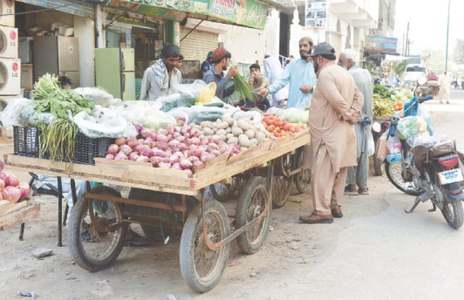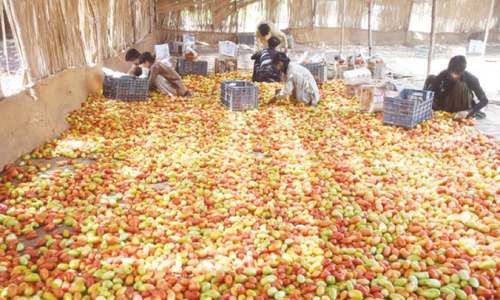AS the Pakistan Bureau of Statistics (PBS) indicates a rising price trend of what it calls sensitive vegetables like tomato (15 per cent) and potato (7.42pc) in its weekly Sensitive Price Index (SPI), stabilising vegetable prices at the retail level has been a struggle for administration in all urban areas of Punjab for the last many months, especially after the advent of Razaman.
The establishing of Ramazan Bazaars for provision of cheaper vegetables is proving inadequate due to limited number and short supplies of essentials (tomato, onion, potato). So, the choice is clear: either spend good part of the day queuing up for these items and risk catching the virus, or purchase from the open market at higher rates.
Even the PBS statistics don’t capture the entire picture. It does not tell that most of vegetables traded in the markets are grown in Punjab, because of agriculture cycle, and should have been much cheaper because they reach market quickly and escape much of post-harvest losses and freight charges. The statistics also don’t include the retail variations, which, sometimes, are high enough to make them look irrelevant. At the retail level, the gourd family (tori, tinda, etc) vegetables cost over Rs50 per kg and others like okra, peas or bitter gourd cost over Rs200 per kg — even more depending on the location where one purchases them from.
Punjab’s vegetable production cycle would, by and large, be over in next two months, and July may see prices skyrocketing as production centres shift to KP and Balochistan – adding cost of transportation, which sometimes is higher than the commodity itself – creating a fresh hue and cry at the popular level.
This has been vegetable cycle for ages now. Till 2018, before the Indians abrogated Article 370 in Occupied Kashmir, Pakistan’s ready solution was opening of Wagah border and letting relatively cheaper vegetables in. With this option closed, it may be time Pakistan to find some indigenous solution to its permanent crisis.
Provinces and agriculture
Despite being a perennial crisis, vegetables production and marketing has never been on the national radar even before the 18th amendment. After it, the federation has developed a consolation point that agriculture is a provincial matter and they need to deal with all shades of agriculture – conveniently forgetting the fact that vegetables are produced in one federating unit and consumed in others and need national, not provincial, planning.
At present, provinces produce vegetables in different times and ecological zones. They operate in the dark, as no one knows what the national requirement is; how much of what is needed and at what time. Take the example of tomato. It is produced in 10 ecological zones across the country at different times and distances from the consumption centres. The Punjab produces 19.50pc but consumes 53pc of the national yield. Sindh produces 36pc and consumes 23pc. KP throws 17pc in national market and consumes 15pc. Balochistan’s tally is 27pc yield and 6pc consumption. Given this picture, can one province deal with national demand and supplies?
That is where the role of a federal player comes in; as the Federal Committee on Agriculture (FCA) does in case of wheat — measuring national requirement every year, assigning targets to the provinces, planning for the targets and finally connecting the market to the produce. Such a thread is totally missing in case of vegetables and generates crisis throughout the year because vegetables are required year-round but they can neither be left in the field nor stored — except for onion and potatoes.
National vegetable commission
Vegetables are seasonal, perishable items that suffer high most-harvest losses and travel across the country at different times of the year. Their production cycles are particularly vulnerable to climatic impact and smaller variation in yield spells trouble through the country.
That is why Pakistan needs to create a national commission on vegetables under the Ministry of National Food Security & Research that can play the role of the FCA; make basic calculations on requirements of all vegetables and see where they can be produced. Prepare and execute a national vegetable policy and plan. A policy, which documents requirement of each one of them, identify potential production areas in different ecological zones across and come up with a production plan. It should also include early warning systems to raise alarm when a crop fails in any part of the country and take corrective measures.
The situation has assumed added significance as green belts around cities are occupied by housing scheme now, leaving a very little traditional space for vegetables that used to serve cities. It needs fresh planning and execution.
For keeping things under control beyond that certain point, the governments need to provide the commission enabling environment by dealing with deeper causes – weakening rupee, ever-increasing oil prices taking freight charges higher and higher and double-digit inflation.
The recent official step to create a national data base to track wheat movement is a welcome step. Its reach needs to be extended to vegetables as well. Unless, we have such a policy, plan and monitoring and guiding federal body in place, varying yields and prices would continue creating political problems for the government, social issues for the society and financial troubles for common man.
Published in Dawn, April 22nd, 2021













































